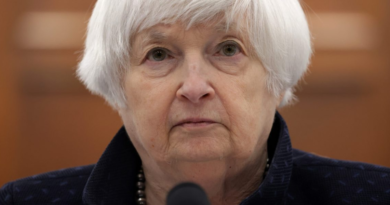Against all odds, Victoria’s Secret survived the Great Recession. That was the easy part
Good morning, Broadsheet readers! Emma Walmsley’s GSK is settling its Zantac lawsuits for $2.2 billion, a space startup hits a milestone, and two authors share an excerpt of their new book, Selling Sexy: Victoria’s Secret and the unraveling of an American icon.
– Scaling sexy. The rise and fall of Victoria’s Secret—from a failure to keep up with a changing culture to retail titan Les Wexner’s association with Jeffrey Epstein—have been written about for years. But in their new book Selling Sexy: Victoria’s Secret and the Unraveling of an American icon, authors Lauren Sherman and Chantal Fernandez weave together the tale of the lingerie-maker’s downfall with its broader business story. Below, in an excerpt from their new book, the authors trace the company’s relative outperformance during the Great Recession—a period where much went right but the seeds of trouble to come in the 2010s were planted.
In 2008, the national consumer mood was gloomy and apprehensive. The United States was officially in a recession, seeing its sharpest downturn since the 1940s. Yet at the Victoria’s Secret Fashion Show, with its pop stars and models in lace, leather, and feathers, there was no evidence of that. As Victoria’s Secret angel Adriana Lima said backstage: “What are we supposed to do—wear cotton?”
“The new sexy is glamor,” CEO Sharen Jester Turney said after the show’s eighth annual taping. Turney faced a job-defining test as the economic downturn mounted. She was the first CEO to lead all Victoria’s Secret divisions across stores, catalog, and beauty and was the third-highest-paid female executive in the U.S. with a total compensation of $20.3 million in 2008.
Meanwhile, an average of 700,000 Americans were losing their jobs each month. And nothing kills the joy of retail therapy like the fear of not being able to make ends meet.
The Great Recession brought an abrupt, painful end to a golden age of American retail, built on networks of shopping malls and biannual discounts. The immediate impact was painful. Stores had little choice but to essentially give their goods away by slashing prices—a strategy with escalating consequences. In retail, the smallest slowdown in sales can be crippling. Products start to pile up. Leslie Wexner, the owner and chairman of parent company L Brands, later likened the recession to riding inside a free-falling elevator with its cable cut, plunging to unknown depths.
But Wexner and Turney navigated the downturn more deftly than many of their peers. Victoria’s Secret cut prices, but typically only on specific categories or collections, so as to limit the perception that the brand was in trouble. Turney also temporarily stopped selling many of the brand’s less-successful styles and smaller product lines that distracted from the best-selling collections and had smaller profit margins. Instead of languishing in Victoria’s Secret stores, those lines and other excess items were funneled to charities and discount retailers in foreign countries, sometimes with the brand’s labels removed to disguise the practice.

Wexner also had the foresight to see beyond the crisis. He insisted that none of his executives cancel product orders with their factories or stiff their stores’ landlords on rent—common tactics for retailers in jeopardy. “He basically said, all of our competitors are going to cancel orders left, right, and backwards,” said a finance executive. “We are going to reestablish our partnership in a very important way.” In 2009, Victoria’s Secret’s annual revenue shrank for the first time in eight years, and sales at stores open more than one year fell by 6%. Operating income fell, too, by about 5%. But the brand’s reputation remained largely intact. Consider that two years later, Kanye West and Jay-Z performed their hit song “N**gas in Paris” live on television for the very first time during the brand’s fashion show. Over 10 million people tuned in for the rap duo’s appearance, and the program had its best ratings in a decade.
When Americans started shopping with gusto again, their perception of a good deal was forever warped. Shoppers expected the same level of nonstop discounts they enjoyed in 2008 and 2009, especially when buying clothing and shoes. But less so at Victoria’s Secret. The rocky economy had not deflated Americans’ obsession with an idealized version of the female body, and Victoria’s Secret’s latest launch—the “Miraculous,” later renamed the “Bombshell” bra—was built with enough padding to make bust sizes appear two cups larger. The slogan “Hello Bombshell” recalled the “Hello Boys” Wonderbra billboards of the 1990s. The new bra became a quick bestseller, despite its nearly $50 price tag. Victoria’s Secret emerged from the recession perfectly positioned as a relatively easy indulgence. It would be nearly a decade before most of its shoppers would begin to question the value of those once reliable thrills—and learn about the troubles lurking beneath them.
Adapted from SELLING SEXY: Victoria’s Secret and the unraveling of an American icon by Lauren Sherman and Chantal Fernandez. Published by Henry Holt and Company. Copyright © 2024 by Lauren Sherman and Chantal Fernandez. All rights reserved.
The Broadsheet is Fortune’s newsletter for and about the world’s most powerful women. Today’s edition was curated by Nina Ajemian. Subscribe here.
ALSO IN THE HEADLINES
– Settling up. GSK, led by CEO Emma Walmsley, agreed to pay up to $2.2 billion to settle around 80,000 cases alleging that its heartburn medication Zantac caused cancer. The company’s stock surged 6% after the agreement. GSK said that the settlement does not mean it is admitting to liability. Bloomberg
– Primary provider. Fei-Fei Li, the “Godmother of AI,” will be using Google Cloud to train AI models for her company World Labs. While Li previously served as Google Cloud’s chief scientist of AI, World Labs and Google said this deal, which could be worth hundreds of millions, is not a result of that connection. TechCrunch
– Creating connections. Bridgit Mendler’s Northwood Space passed its first development test, connecting to orbiting Planet Labs imagery satellites. The startup, which the former Disney star launched last year, is focused on ground stations and aims to “introduce a new standard for connectivity for companies,” per Mendler. CNBC
– Accounts of abuse. Sixty five more women have come forward to the BBC accusing businessman Mohamed Al Fayed of sexual abuse; 37 of these women worked at the British department store Harrods, which Al Fayed owned. These allegations follow the BBC’s recent documentary and podcast on the abuse allegations the late Al Fayed faces.
MOVERS AND SHAKERS
Threads Styling, a chat-based shopping platform, named Mo White CEO; she succeeds founder Sophie Hill. White previously served as CEO at Hyperwild.com.
OMNY Health, a healthcare company for cross-industry data sharing, appointed Ivy Weng to chief commercial officer. Most recently, she was group vice president of life sciences at Komodo Health.
Rithum, a commerce network, named Suzin Wold chief marketing officer. She most recently served as CMO of Sama.
Sheppard Pratt, a mental health, substance use, developmental disability, special education, and social services nonprofit provider, appointed Jennifer Coyne as general counsel. Previously, she was principal at Miles & Stockbridge.
ON MY RADAR
Here’s why the chief diversity officer of Microsoft is taking notes from smaller companies Fortune
Burger King’s new moms ad deserves praise, not outrage Bloomberg
Voting after 40 Marie Claire
PARTING WORDS
“Big genre pieces that are global, big male action pieces—we know those things work… [L]et’s get out there and break ground with women and see the results of that.”
— Jennifer Salke, head of Amazon MGM Studios, on Amazon’s commitment to building up its female-led programming




